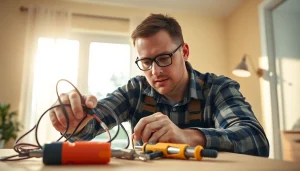Comprehensive Guide to Electrical Service: Safety, Installation, and Maintenance

Understanding Electrical Service Basics
In today’s technologically driven society, an understanding of Electrical Service is of utmost importance for both homeowners and business owners. This article will provide a comprehensive overview of what electrical service entails, its core components, and its significance in maintaining safe and efficient power supply to your properties.
What is Electrical Service?
Electrical service refers to the system that delivers electricity from the power grid to individual businesses and homes. This essential infrastructure encompasses various elements such as wiring, circuit breakers, and service panels. Each of these components plays a critical role in ensuring that electricity is safely transmitted and used throughout the building.
The process begins at the electrical meter, which measures energy usage. The service then passes through the main service panel, where it is distributed through various circuits to different parts of the building. Each electrical installation must comply with local codes and safety regulations, underscoring the need for professional evaluation and installation.
Components of Electrical Service
Understanding the components of electrical service is crucial for effective management and safety. Below are the primary components involved:
- Service Panel: Also known as a breaker panel, this is where the electrical service enters the building and is divided into different circuits.
- Electrical Meter: This device measures the amount of electricity used, providing critical data for billing and energy management.
- Wiring: Electrical wiring connects different components in the system and is responsible for delivering power to appliances and outlets.
- Outlets and Switches: These are the interfaces through which users access electrical power for various devices.
- Grounding System: Grounding enhances safety by providing a path for electrical currents to follow in case of faults, ensuring equipment and users are protected from electrical shocks.
Importance of Professional Electrical Service
While some homeowners may attempt DIY electrical work, the significance of professional electrical service cannot be overstated. Professionals are trained to identify and resolve potential issues that may arise, ensuring the electrical system operates safely and efficiently.
Additionally, licensed electricians understand local codes and ordinances, which helps avoid legal issues related to electrical work. Professional service also boosts overall home safety, significantly reducing the risks of electrical fires or other hazards associated with faulty installations.
Common Electrical Service Issues
Despite proper installation and upkeep, common issues may still arise in electrical systems. Understanding these issues helps homeowners recognize the signs that professional intervention is needed.
Identifying Electrical Problems
There are several telltale signs that indicate an electrical issue, including:
- Flickering Lights: Frequent dimming or flickering lights suggest an overloaded circuit or a problem with the wiring.
- Burning Smell: A burning odor near electrical outlets or appliances is a serious warning sign and requires immediate attention.
- Tripped Breakers: A circuit breaker that frequently trips indicates that the circuit is overloaded or there is a fault in the wiring.
- Hot Outlets: An outlet that feels warm to the touch can signal a serious problem. This could point to faulty wiring or an overload in the circuit.
Impact of Neglecting Electrical Service
Ignoring electrical service issues can lead to severe consequences, ranging from minor inconveniences to catastrophic events. Overloaded circuits can result in electrical fires, while faulty wiring may lead to harmful electrical shocks. Furthermore, neglecting regular maintenance can decrease the longevity of electrical appliances and systems, incurring additional costs in the long run.
Common Misconceptions about Electrical Service
There are several misconceptions surrounding electrical service that can lead to unsafe practices:
- DIY Electrical Work is Safe: Many believe minor electrical repairs or installations can be safely handled without a professional. However, this can be dangerous and inefficient.
- All Electrical Work is the Same: Not all electrical needs are alike. Residential, commercial, and industrial electrical services have different requirements and standards.
- Older Homes are Safe Without Upgrades: Many assume that if electrical systems in older homes have functioned adequately for years, they do not need upgrading. This can be a dangerous assumption leading to serious safety hazards.
Choosing the Right Electrical Service Provider
When it comes to electrical services, selecting the right provider is crucial for safety and efficiency. A professional provider will not only have the technical expertise but will also adhere to safety regulations to avoid risks associated with electrical works.
What to Look for in Electrical Service Professionals
When searching for an electrical service provider, consider the following:
- Licensing and Certification: Verify that the electrician is properly licensed and certified for the work to be performed.
- Experience: Ensure the electrician has substantial experience, particularly with the type of work you require.
- Insurance: Professional electricians carry liability insurance, providing you with protection against accidents during their work.
- References and Reviews: Research feedback from past clients to gauge the provider’s reliability and quality of service.
Questions to Ask Your Electrical Service Provider
Before hiring an electrical service provider, consider asking the following questions:
- What experiences do you have with projects similar to mine?
- Can you provide a detailed estimate of the work involved?
- What are your safety protocols?
- How do you handle unexpected issues that arise during the work?
Importance of Licensing and Insurance
It is imperative to select an electrical service provider that holds valid licenses and insurance. Licensing guarantees that the electrician adheres to local standards and regulations. Additionally, liability insurance protects homeowners from any liability resulting from accidents or damages during the project. Always verify these credentials before hiring.
Electrical Service Installation Process
Understanding the installation process of electrical services can help homeowners feel more informed and prepared to engage with professionals.
Steps in Electrical Service Installation
The installation of electrical service typically follows these steps:
- Site Assessment: The electrician evaluates the site to determine the best system configuration based on your specific needs.
- Design Plan: A design plan is formulated, outlining the layout required for wiring, outlets, and other components.
- Installation: This step involves laying wires, connecting the service panel, installing outlets, and ensuring everything complies with safety standards.
- Testing: After installation, the system undergoes thorough testing to ensure safety and functionality.
Safety Precautions During Installation
Safety during installation is paramount. Electricians should follow industry standards, including:
- Wearing appropriate protective gear.
- Utilizing insulated tools.
- Maintaining a clean work area to prevent accidents.
- Ensuring the power is turned off during installation.
Post-Installation Inspection and Testing
Once the electrical service installation is complete, a post-installation inspection is critical. This involves examining all components to ensure compliance with safety regulations and performance metrics. Testing appliances and fitting connections should be carried out to finalize the installation, confirming the system’s efficiency and safety.
Maintaining Your Electrical Service
Proper maintenance of electrical systems is crucial to ensure longevity, safety, and performance efficiency.
Routine Maintenance Tips for Electrical Service
Regular maintenance can help identify issues before they become significant problems. Here are some maintenance tips:
- Check and replace worn-out outlets and switches.
- Regularly inspect wiring for signs of wear or damage.
- Schedule regular inspections with a licensed electrician.
- Keep the service panel accessible and organized.
Signs You Need to Schedule a Maintenance Check
Recognizing when to schedule a maintenance check is essential. Look for these signs:
- Frequent tripping of circuit breakers or blown fuses.
- Unusual increase in electricity bills.
- Recurring electrical surges.
- Presence of an electrical burning smell.
Benefits of Regular Electrical Service Maintenance
The benefits of consistent maintenance extend beyond safety. Regular electrical service maintenance can lead to:
- Cost Savings: Identifying and addressing small issues can prevent costly repairs and energy waste.
- Enhanced Safety: Regular inspections minimize the risk of electrical fires and other hazards.
- Improved Performance: Well-maintained systems operate more efficiently and last longer, enhancing overall performance in your home or business.





